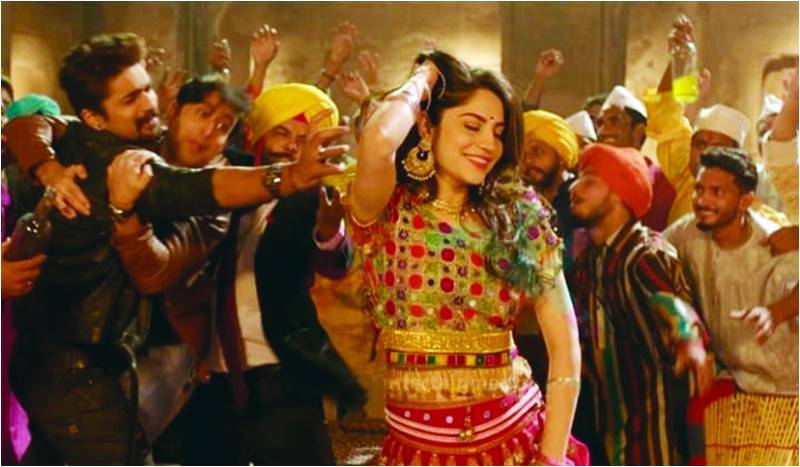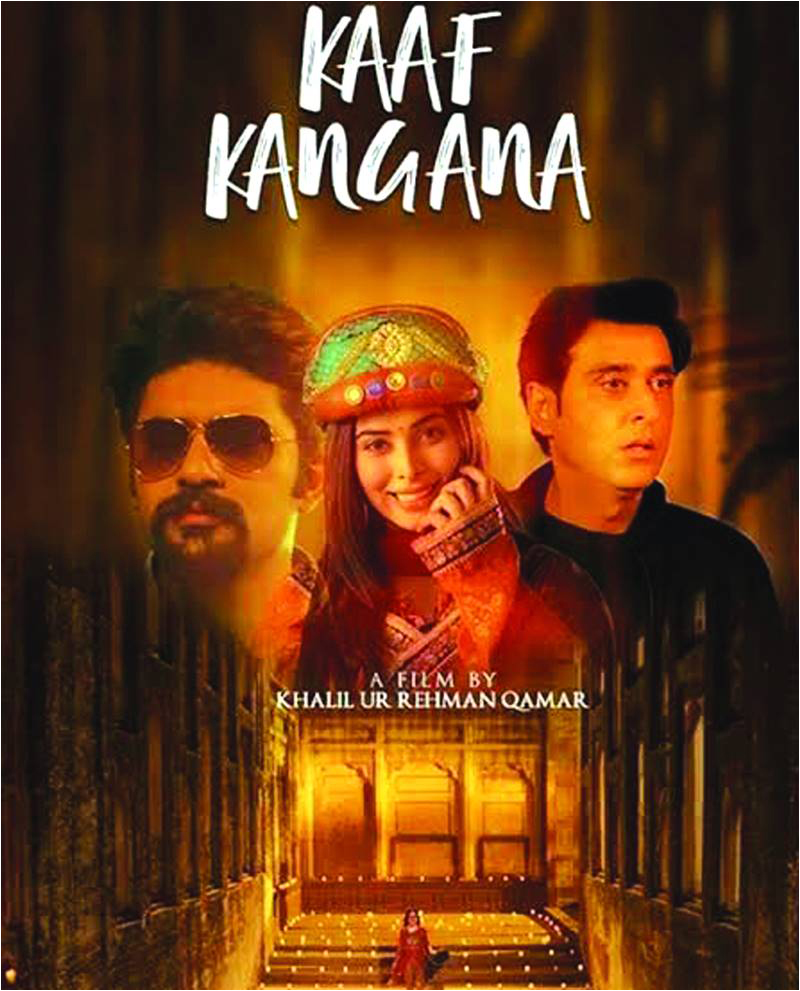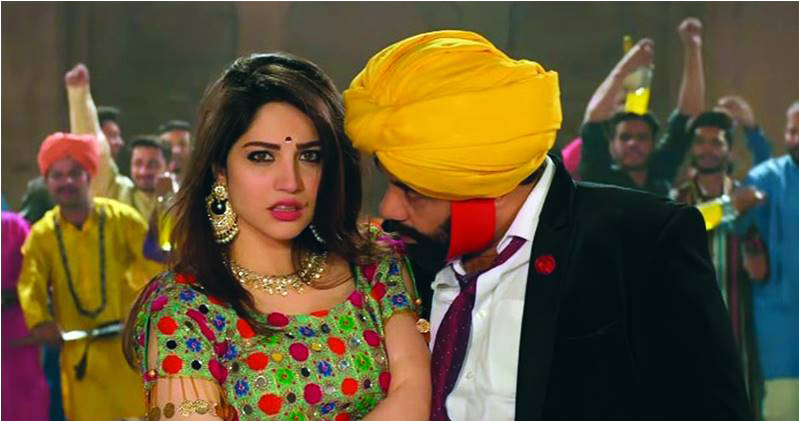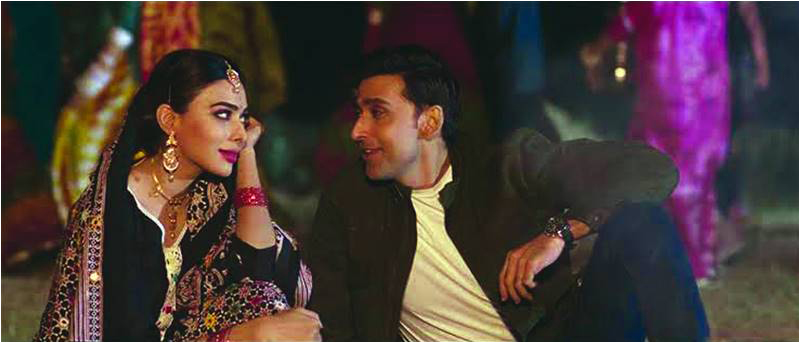
Neelum Munir triggered quite a debate recently when she spoke of her “first and last” item number that she had done in Kaaf Kangana. She said that she only performed because it was an ISPR project.
Last week, the DG ISPR “defended” the item number saying, in effect, that since the actor was playing an Indian girl, there is absolutely nothing wrong with it.
This was followed by Khalil-ur-Rehman Qamar, the film’s producer, writer and director, saying in an interview that women should “prove their equality by gang-raping men”. And all this is happening, just as Kaaf Kangana is being screened across multiplexes nationwide.

Now, we don’t generally comment on the politics of any film while discussing it in this space, purely because it would render almost the entirety of Lollywood production – even in this yet-to-materialize “revival” phase – absolutely futile.
And while the intro above was necessitated by the fact that no discussion on Kaaf Kangana could take place without underlining the bombshells being thrown by those affiliated with it on the media, one would also like to reiterate the reality that the film itself underscores precisely what mindset was involved in its making.

Therefore, Kaaf Kangana is hardly the ideal backdrop amidst which we should be having the much needed debate on women’s rights and objectification. For, where an item number has become the recent vanguard of progressive discourse, the film is brimming over with a list of items that fall in the lowest echelons of Pakistani societal regression.
The trailer of the movie, which depicts the increasingly sensitive Kashmir issues amidst a flurry of overacted jingoism would have given one an idea what the film was going to go all-out. The most regressive interpretations of patriotism and nationalism are stuffed with the blandest love story you could think of, resulting in the most spectacular wastage of time and money in recent memory.
This is the directorial and production debut of veteran writer Khalil-ur-Rehman Qamar, who has scripted much heralded dramas like Boota from Toba Tek Singh, Landa Bazaar, Pyarey Afzal and Sadqay Tumhare, along with the mega hit film Punjab Nahi Jaungi.

Without commenting on his political and sociological viewpoints, which indeed he’s made abundantly clear in the example cited above, one can say that he has delivered decent writing in terms of weaving together interesting plots and scripts – in the past!
In addition to the narrative faux pas, none of that writing ability is on display in Kaaf Kangana. As a director he appears to have absolutely no control over the pace, storyline, plot and acting in the movie. vip-popki.net/prostitutka-kiev
Furthermore, in choosing antediluvian sets, leaden makeup and overbearing costumes for the entire cast, KRQ has ensured that the film is also a visual disaster, making it difficult for even his diehard fans to endure this flick.
As is evident, Kaaf Kangana is a cross-border love story. And as is the case with jingoists on both sides of the LoC, of course, it has to be “our” boy and “their” girl.
Ali Mustafa (Sami Khan) and Kangana (Eshal Fayyaz) were both finalists at a SAARC quiz competition; thence the love blossoms in Lahore. After Kangana’s return to India, Ali vows to bring her back.
This the cue for countless, and pointless, twists and turns, deafening background music, excruciating acting, self-imploding writing – in short an unrelenting catastrophe for the audience.
KRQ’s greatest strength, his dialogue writing, is among the greatest disasters on show, as he looked to throw in as many punches as he could squeeze inside the runtime, as a result of which most of them smack him, the entire team, and the film as a whole, right on their own face.
Despite that and everything else that is wrong with the film, it’s arguably the acting that takes the rotten cake.
Sami Khan was all set to become the lowest point of the film, but Eshal Fayyaz snatches that particular spotlight away from him, with the most expressionless performance you might see in your entire lifetime. Ayesha Omer appeared to be the lone professional actor on the screen, but had a limited role to make any lasting impact.
Given what is unfolding in the storyline, you might actually end up enjoying the music. The soundtrack has a 1980s-90s feel with some decent tunes. And the many problems with the item number might just end up being the last thing on your mind by the time you’re done with the film – or it with you.
The film is a disappointment in every department and in every definition of the word. It’s obvious that KRQ and his team completely lost any interest in the film halfway through it, and the noise generated in the aftermath of its release is just a combination of frustration and a misplaced quest to stay relevant.
Last week, the DG ISPR “defended” the item number saying, in effect, that since the actor was playing an Indian girl, there is absolutely nothing wrong with it.
This was followed by Khalil-ur-Rehman Qamar, the film’s producer, writer and director, saying in an interview that women should “prove their equality by gang-raping men”. And all this is happening, just as Kaaf Kangana is being screened across multiplexes nationwide.

Now, we don’t generally comment on the politics of any film while discussing it in this space, purely because it would render almost the entirety of Lollywood production – even in this yet-to-materialize “revival” phase – absolutely futile.
And while the intro above was necessitated by the fact that no discussion on Kaaf Kangana could take place without underlining the bombshells being thrown by those affiliated with it on the media, one would also like to reiterate the reality that the film itself underscores precisely what mindset was involved in its making.

Therefore, Kaaf Kangana is hardly the ideal backdrop amidst which we should be having the much needed debate on women’s rights and objectification. For, where an item number has become the recent vanguard of progressive discourse, the film is brimming over with a list of items that fall in the lowest echelons of Pakistani societal regression.
The trailer of the movie, which depicts the increasingly sensitive Kashmir issues amidst a flurry of overacted jingoism would have given one an idea what the film was going to go all-out. The most regressive interpretations of patriotism and nationalism are stuffed with the blandest love story you could think of, resulting in the most spectacular wastage of time and money in recent memory.
This is the directorial and production debut of veteran writer Khalil-ur-Rehman Qamar, who has scripted much heralded dramas like Boota from Toba Tek Singh, Landa Bazaar, Pyarey Afzal and Sadqay Tumhare, along with the mega hit film Punjab Nahi Jaungi.

Without commenting on his political and sociological viewpoints, which indeed he’s made abundantly clear in the example cited above, one can say that he has delivered decent writing in terms of weaving together interesting plots and scripts – in the past!
In addition to the narrative faux pas, none of that writing ability is on display in Kaaf Kangana. As a director he appears to have absolutely no control over the pace, storyline, plot and acting in the movie. vip-popki.net/prostitutka-kiev
Furthermore, in choosing antediluvian sets, leaden makeup and overbearing costumes for the entire cast, KRQ has ensured that the film is also a visual disaster, making it difficult for even his diehard fans to endure this flick.
As is evident, Kaaf Kangana is a cross-border love story. And as is the case with jingoists on both sides of the LoC, of course, it has to be “our” boy and “their” girl.
Ali Mustafa (Sami Khan) and Kangana (Eshal Fayyaz) were both finalists at a SAARC quiz competition; thence the love blossoms in Lahore. After Kangana’s return to India, Ali vows to bring her back.
This the cue for countless, and pointless, twists and turns, deafening background music, excruciating acting, self-imploding writing – in short an unrelenting catastrophe for the audience.
KRQ’s greatest strength, his dialogue writing, is among the greatest disasters on show, as he looked to throw in as many punches as he could squeeze inside the runtime, as a result of which most of them smack him, the entire team, and the film as a whole, right on their own face.
Despite that and everything else that is wrong with the film, it’s arguably the acting that takes the rotten cake.
Sami Khan was all set to become the lowest point of the film, but Eshal Fayyaz snatches that particular spotlight away from him, with the most expressionless performance you might see in your entire lifetime. Ayesha Omer appeared to be the lone professional actor on the screen, but had a limited role to make any lasting impact.
Given what is unfolding in the storyline, you might actually end up enjoying the music. The soundtrack has a 1980s-90s feel with some decent tunes. And the many problems with the item number might just end up being the last thing on your mind by the time you’re done with the film – or it with you.
The film is a disappointment in every department and in every definition of the word. It’s obvious that KRQ and his team completely lost any interest in the film halfway through it, and the noise generated in the aftermath of its release is just a combination of frustration and a misplaced quest to stay relevant.

